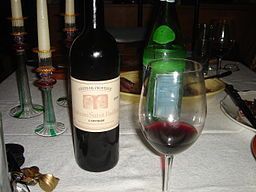Resveratrol Benefit: Red Wine Compound May Protect Against Hearing Loss

Resveratrol, a plant compound found in the skin of red grapes and thus in red wine, has gained much attention for its disease-combating and potentially anti-aging properties.
There may be another benefit to the substance: protecting against hearing loss and cognitive decline.
A study published this week in the journal Otolaryngology-Head and Neck Surgery shows that when healthy rats are given resveratrol before being exposed to loud noise for a long period of time, they are less likely to suffer from the long-term effects of noise-induced hearing loss.
This study, led by Dr. Michael D. Seidman, director of the Division of Otologic/Neurotologic Surgery at the Henry Ford Hospital in Detroit, focuses on resveratrol's effect on bioinflammation, the body's response to stresses and the possible cause of degenerative conditions like Alzheimer's disease, cancer, and aging.
Resveratrol, celebrated for its antioxidant and anti-inflammatory properties, has enjoyed much hype as a miracle dietary supplement, with some even suggesting that red wine is part of a healthy diet.
Dr. Seidman and his colleagues explore resveratrol's role in the inflammatory process as it relates to aging, cognition and hearing loss.
"Resveratrol is a very powerful chemical that seems to protect against the body's inflammatory process as it relates to aging, cognition and hearing loss."
Hearing declines over time for most people, ultimately affecting nearly one in five Americans. Noise-induced hearing loss is a growing medical issue for the American military, with more than 12 percent of troops returning from combat in Iraq and Afghanistan with significant hearing loss.
With the ubiquity of personal earphones and mobile devices turned up to high volumes, it is projected to be an issue for civilians as well.
Noise-induced hearing loss can eventually cause difficulties with sleep and communication, and the stress can even raise the risk for heart disease by increasing a person's blood pressure, lipids and blood sugar.
The study was designed to identify the potential protective mechanism of resveratrol after noise exposure by measuring its effect on cyclooxygenase-2 (or COX-2, key to the inflammatory process) protein expression and the formation of reactive oxygen species, which plays a key role in cell signaling and homeostasis.
The study reveals that while exposure to extremely loud sound causes a time-dependent increase in COX-2 protein expression in rats, resveratrol significantly inhibits COX-2 expression, reduces reactive oxygen species formation, and reduces noise-induced hearing loss after noise exposure.
According to Dr. Seidman, "by giving animals resveratrol, we can reduce the amount of hearing and cognitive decline."
Before you start popping resveratrol supplements, it is important to note that the implications of this study for humans are inconclusive.
Since there have been very few studies conducted on resveratrol in humans, it is possible that the substance works differently than it does in rats. Also, it is possible that resveratrol affects the human body differently in isolation than it does in red wine.
Until more research is conducted, enjoy your red wine - but don't expect it to counteract the effects of your earbuds.
Via Science Daily



























